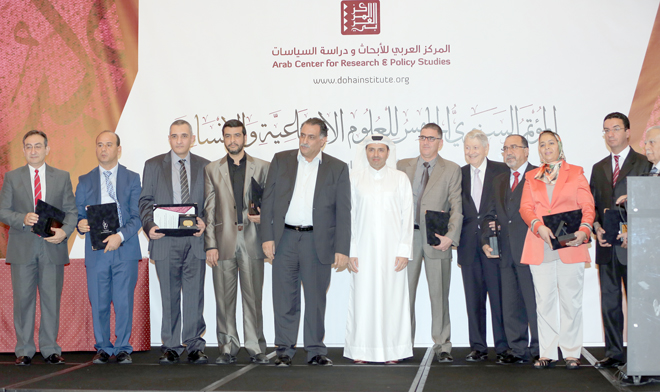 |
| Award winners from the Arab Prize ceremony are joined by: Azmi Bishara (5th from left); HE Mohammad Al Hammadi (6th from left) and Taher Kanaan (8th from left) |
An awards ceremony held in Doha on Monday, 14 March saw awards presented to original researchers working in the social sciences and humanities from across the Arab world. Nine award winners emerged from the competition where the total prize money could have reached up to US$160,000, while three of the awards—set aside for researchers whose work was previously published in foreign languages—went unclaimed this year. The award ceremony, which is part of an annual Conference on Social Sciences and the Humanities organized yearly by the Doha-based Arab Center for Research and Policy Studies, was presided over by Qatar’s Minister of Education and Higher Education, His Excellency Dr. Mohammed Bin Abdul Wahid Al Hammadi. In presenting the awards, Al Hammadi was joined on the stage by the Chairman of the ACRPS Board of Directors, His Excellency Dr. Taher Kanaan (a member of Jordan’s upper house of parliament) and by the General Director of the ACRPS, Dr. Azmi Bishara. Before the winners were presented, the ACRPS' Wajih Kawtharani introduced the topics for next year's Prize.
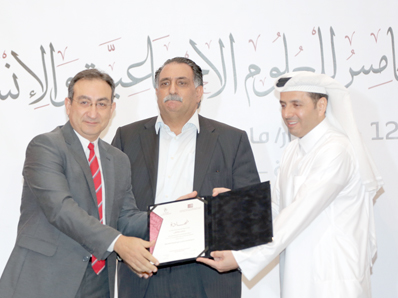 |
| Samer Akkash (left) receives the Arab Prize for his work on "Liberty and the New Urbanism" from Qatar's Minister of Education, H.E. Mohammad Al Hammadi. ACRPS Director Azmi Bishara is in the center. |
The tradition of awarding the Arab Prize began with the very first Annual Conference of the Social Sciences and Humanities, which was held in Doha, Qatar, during 2011. In their original form, the prizes would be awarded to Arab scholars in the social sciences and humanities who submitted unpublished work related to one of the twin themes chosen yearly to form the plank of the Conference. This year’s two themes were “The Question of Liberty in Contemporary Arab Thought” and “The Arab City: the Challenges of Urbanization in a Transforming Society”. The recipients chosen by the Arab Prize Committee were announced by its Chairman, Dr. Wajih Kawtharani, a historian and member of the research staff at the ACRPS Beirut Office.
Before introducing the winners, Kawtharani addressed the audience gathered and pointed out the vital societal relevance of the themes chosen for this year’s Arab Prize, highlighting how questions of individual liberty and the individual as a member of rapidly urbanizing countries were at the forefront of concerns for today’s Arab region. Kawtharani also emphasized how the twin themes of the meeting, while covering a huge breadth of topics, were in fact deeply intertwined: neither liberty nor the ideals of an urban existence could be fully realized without autonomous individuals.
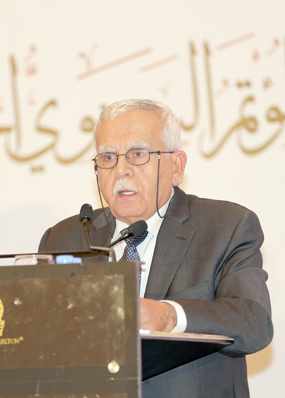 |
| Wajih Kawtharani addresses the audience. |
A total of 24 papers were submitted in the first category for consideration for the Arab Prize: original works which addressed the question of liberty in contemporary Arab thought. The Arab Prize committee had decided not to award a first place Prize for this year, opting instead to give two second place Prizes ($15,000 each), both from Tunisia: Manji Sarbaji, who submitted a work titled “What does it mean to think of liberty in Arabic?” ; and Suheil El Habib, whose paper was titled “The Failure of Arab Ideological Dogma to Accept the Historically Possible: On Modern Civil Liberties and the Modern State in the Arab Countries”. In third place was ($10,000) Samer Akkash from Syria whose submitted work was titled “Liberty and the New Urbanism During the Arab Renaissance”.
First place ($25,000) in the second category of prizes, awarded for original research on Arab urbanization in the midst of social transitions, went to Algerian Muawiya Saidouni, whose paper titled “The Past, Present and Future Prospects of Arab Urban Planning and Modernization: the Crisis as Seen through the Example of Algeria”. Saidouni’s paper was judged the best of the 25 research papers approved by the Arab Prize Committee to compete for this year’s award. Driss Maqboul from Morocco won second place ($15,000) in this category, for his research paper entitled “The Modern Arab City: a Sociolinguistic Reading of the Symptoms of the Disease of Urbanization”. No third place Prizes were offered in this category for 2016, by decision of the Arab Prize Committee.
The Arab Prize was also offered to a further three participants who authored work previously published in Arabic language peer reviewed journals. Moroccan researcher Rachid Saadi won first place ($25,000) in this category for his paper titled “Religion, Ethics and Politics: Universal Definitions and the Isolation of the Arab-Islamic World, and Freedom of Conscience as a Practical Measure”, published in 2014 in Al Bab. The winner of the second place prize ($15,000) given for work previously published in Arabic language academic journals was Khleif Gharaybeh from Jordan for his paper titled “An Analysis of the Present State of Affairs for Traditional Homes in the Town of Kafranja in the Ajloun Governorate”. Gharaybeh’s paper was published in 2014 in Jordan’s Journal of Applied Sciences. Morocco’s Majeda Sawab won the third place ($10,000) Prize for work previously published in an Arabic language academic journal for a paper titled “The Restructuring of Informal Housing in Morocco: a Review of Previous Approaches”, published in 2013 by the Journal of the Faculty of Arts and Humanities, published by the Sidi Mohammed Bin Abdullah University.
Due to the lack of appropriate submissions, the Arab Prize Committee also decided to withhold any awards for work previously published in foreign languages in 2016—in general, the Arab Prize is available for work by Arab scholars which is published in English, French, German and Spanish.
New Themes for 2017 Arab Prize Announced
Before concluding, Kawtharani announced the twin themes for which the Arab Prize would be awarded during its sixth season. These would be: “The Question of Ethics: from the Birth of Written Islamic History to the Present-day” and “Arab Youth: Migration and the Future”. The Arab Prize continues to be the largest such award given for Arab scholarship in the pure and applied social sciences and humanities, and one of the most high profile honors for academics in the Middle East and North Africa. By tradition, the award ceremony is conducted as a part of the ACRPS’ annual Conference of the Social Sciences and Humanities, and the research work which is selected for the Prize bears some relevance to one of the twin themes under discussion during the Conference.
|
Arab Prize: work submitted to the Prize on the theme of "Liberty in Contemporary Arab Thought"
|
|
|
|
| Receiving the Arab Prize from Al Hammadi and Bishara, counter clockwise from top right: Habib, Akkash and Sarbaji. |
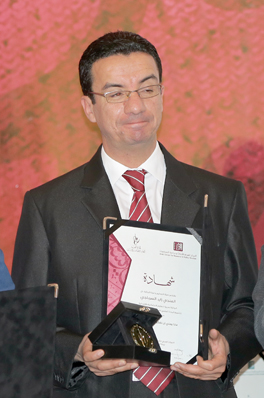 |
|
Arab Prize: for research work submitted to the Prize on the topic of "the Modern Arab City" "
|
|
Left to right: Saidouni and Maqboul
|
|
|
|
|
Arab Prize: Works previously published in Arabic language academic journals
|
|
|
|
Counter clockwise, receiving awards from Al Hammadi and Kanaan: Saadi; Gharaybeh; Sawab.
|
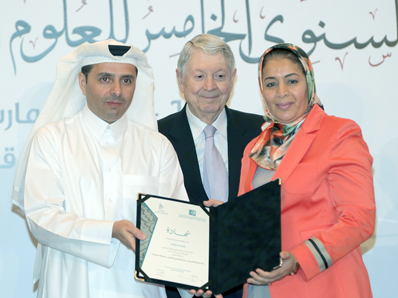 |